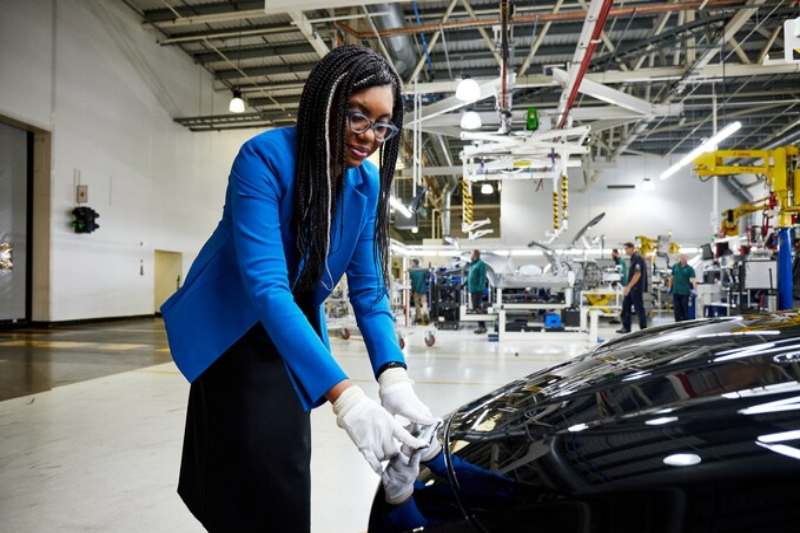In response to mounting industry calls for a more aggressive strategy to unlock investment in the net zero transition, the government has increased its plans to support the development of important domestic manufacturing sectors, including clean energy, electric vehicles, batteries, and zero carbon aircraft.
Following confirmation in the Autumn Statement last week that £4.5 billion in funding has been set aside to support several important green manufacturing industries over the course of the upcoming Parliament, ministers released a plethora of documents yesterday.
The UK’s latest response to the global competition for green technology investment, which has been sparked by the EU’s Net Zero Industry Act and the US Inflation Reduction Act (IRA), is reflected in the new plans.
Business Secretary Kemi Badenoch announced the official launch of the Advanced Manufacturing Plan on Sunday, stating that the set of policies and funding would support job creation and economic growth in the United Kingdom.
“The UK recently overtook France to become the world’s eighth largest manufacturing economy,” she stated. Building on that accomplishment, the Advanced Manufacturing Plan will direct funding to areas where have a competitive edge.
“Industry wants a stable, long-term plan that has support for cutting edge technologies and a trade policy that delivers. The Advanced Manufacturing Plan does precisely that, securing the highly skilled jobs of the future and driving economic growth.”
The plan, according to the government, expanded on its recent investments in the gigafactories of Nissan and BMW in Sunderland and Sheffield, respectively, and in Boeing’s aerospace manufacturing operations.
Declared “undoubtedly clear that the UK is open for business” was the £4.5 billion plan, according to Prime Minister Rishi Sunak.
“We are going full throttle to back British businesses and make the UK a world leader in manufacturing – which already makes up over 43 percent of all our exports and employs 2.6 million people across the country,” he said. “Today’s plan will not only give the industry the long-term certainty they need to grow and invest further in the UK, but it will also lay the foundations to create more jobs and opportunities for people across the country. ”
The Chancellor announced last week’s Autumn Statement, and the documents restate the government’s intention to expedite planning procedures, address the backlog of grid connections, and encourage business investment in plant machinery.
A plan to expand the government’s Made Smarter digital technology adoption program to all English regions in 2025 and 2026, followed by working with devolved governments to roll out the scheme across the UK, is one of the additional measures outlined in the strategy. Another is a £50 million apprenticeships pilot scheme to investigate ways to stimulate training in advanced manufacturing sectors. Finally, a commitment to establish a Hydrogen Taskforce with the goal of maximizing investment opportunities in hydrogen technology manufacturing is made.
The government also unveiled the UK’s eagerly anticipated Battery Strategy, which outlines plans to decrease the automotive industry’s reliance on Chinese batteries and materials and expand domestic supply chains for electric vehicles (EVs).
It lays out a plan to build on the work of the Advanced Propulsion Center and the current Automotive Transformation Fund by allocating £2 billion in new capital and funding for research and development over the course of five years, until 2030.
The commitment consists of £12 million for a new Advanced Materials Battery Industrialization Center and £38 million to upgrade the UK Battery Industrialization Center’s development facilities. Additionally, the government has set aside £11 million for the development of technologies spanning the battery value chain by 20 competition winners.
“Growing the battery industry is vital to positioning the UK as the best location in the world to manufacture electric vehicles and building on the confidence we’ve given our supply chain through recent successes such as the investments from Tata, BMW and Nissan, plus the wealth of government support available to businesses,” said Industry Minister Nusrat Ghani.
“help businesses become more innovative and productive, future-proofing our economy and supporting our ambition towards a cleaner, greener future”. she continued, was the new strategy’s promise.
The CEO of trade association MakeUK, Stephen Phipson, praised the release of the “much-needed” battery strategy.
“Having a joined-up battery plan in place will be critical for the UK economy to benefit fully from new technological opportunities going forward, and we must ensure that manufacturing involves the entire supply chain, right from design to manufacturing and recycling, closely connecting car and battery industries,” he said.
In order to recover the vital materials required for the low-carbon economy, recycling will also be crucial, and this integrated Advanced Manufacturing Plan will contribute to improved coordination amongst all of the clean energy sectors.
Business groups are expected to embrace the new funding and strategies, but leaders in the green business community are a little taken aback by the amount of financial support provided in comparison to the US and EU.
Steve Coulter, head of economy at Green Alliance, responded to the news last week that £4.5 billion would be provided to support advanced manufacturing by saying: “the Chancellor splashed £20bn on tax cuts in the Autumn Statement, but promised pocket change to the job-creating green industries of the future – and he plans to reduce productivity-boosting capital spending in the coming years.
“It’s positive that the government has stopped ignoring businesses, who want to know that the UK has a plan for green growth. But while the UK promises to invest in key green industries from 2025 onwards, the US has started work on hundreds of clean manufacturing projects. We need bolder plans and concrete commitments to green growth, or we’ll lose out.”


